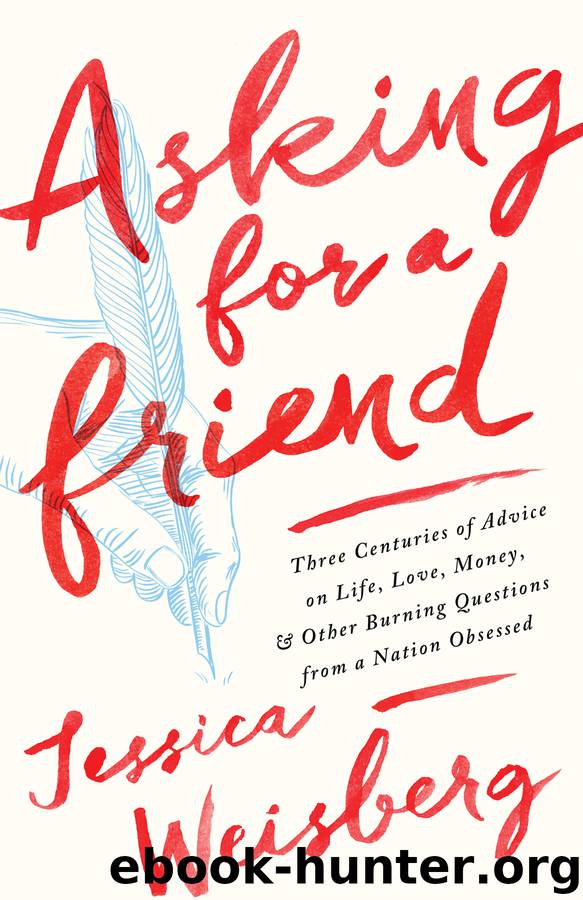Asking for a Friend by Jessica Weisberg

Author:Jessica Weisberg
Language: eng
Format: epub
Publisher: PublicAffairs
Published: 2018-04-03T04:00:00+00:00
IN 1976, SPOCK published a new edition of the book, its fourth, to modernize its position on gender roles. “It is indicative of my sexism that it took me three years of discussions with many patient women before I fully understood the nature of my sexism and felt ready to begin, in 1973, the revision of Baby and Child Care that was published in 1976,” he later wrote. In the updated edition, he cautions parents against praising little girls solely for their appearance and little boys solely for their accomplishments. He had changed his views on working mothers. “Both parents have an equal right to a career if they want one, and an equal obligation to share in the care of their children,” he wrote. For the first time, the instructional drawings included images of black parents as well as white ones.
His politics had little effect on the substance of his parenting advice. Feminism didn’t change his thoughts on weaning or feeding schedules. He advocated breastfeeding in 1945, and advocated it again in 1976 and in 1998. Spock changed his advice as medical research advanced: his first edition advised that an infant sleep on her stomach, while the later editions instructed that she be placed on her back. But the basics didn’t change: children needed the love of their parents, and parents were instinctually primed to provide it. He never abandoned medicine for punditry. Into his eighties, he wrote a column for Parenting magazine and continued to update his book. The 1998 edition includes advice for gay and lesbian parents.
Between 1946 and 1998, the book sold more than forty million copies, its sales second only to the Bible. It’s no longer on the bestseller list but remains beloved for its clarity and evenhandedness. A friend of mine who recently had a child received three well-worn copies from relatives. “There’s no judgment to it (unlike a lot of other books that seem to have strong opinions about breast feeding, etc) and simply gives the information new (and experienced) parents need,” one online reviewer wrote. The word unbiased is among the most frequently used words on his book’s Amazon page. His advice was popular because it didn’t sound like advice.
His critics accused him of hypocrisy, of instructing parents to raise kids they couldn’t control. Spock was a hypocrite, though for different reasons. He was the godfather of a certain genre of advice that beckons readers to trust themselves and avoid self-doubt. He told readers that their infants were heartier than they appeared, that it was normal to feel ambivalent about a pregnancy or a newborn, or to lose one’s patience with a wailing toddler. He bears responsibility for the deluge of parenting advice literature on “what’s okay” and “what’s normal” on subjects so basic they wouldn’t seem to require an expert’s guidance. Parents now read books to be told that it’s normal for there to be tension with an overzealous grandparent, that it’s okay to allow your child to cry herself to sleep, or sleep in your bed, or watch television, or play alone.
Download
This site does not store any files on its server. We only index and link to content provided by other sites. Please contact the content providers to delete copyright contents if any and email us, we'll remove relevant links or contents immediately.
| Africa | Americas |
| Arctic & Antarctica | Asia |
| Australia & Oceania | Europe |
| Middle East | Russia |
| United States | World |
| Ancient Civilizations | Military |
| Historical Study & Educational Resources |
Underground: A Human History of the Worlds Beneath Our Feet by Will Hunt(12097)
Sapiens by Yuval Noah Harari(5370)
Navigation and Map Reading by K Andrew(5156)
The Sympathizer by Viet Thanh Nguyen(4390)
Barron's AP Biology by Goldberg M.S. Deborah T(4150)
5 Steps to a 5 AP U.S. History, 2010-2011 Edition (5 Steps to a 5 on the Advanced Placement Examinations Series) by Armstrong Stephen(3733)
Three Women by Lisa Taddeo(3433)
Water by Ian Miller(3185)
The Comedians: Drunks, Thieves, Scoundrels, and the History of American Comedy by Nesteroff Kliph(3079)
Drugs Unlimited by Mike Power(2594)
A Short History of Drunkenness by Forsyth Mark(2297)
DarkMarket by Misha Glenny(2212)
And the Band Played On by Randy Shilts(2209)
The House of Government by Slezkine Yuri(2206)
The Library Book by Susan Orlean(2069)
Revived (Cat Patrick) by Cat Patrick(1991)
The Woman Who Smashed Codes by Jason Fagone(1973)
The Absolutely True Diary of a Part-Time Indian by Sherman Alexie(1913)
Birth by Tina Cassidy(1903)
